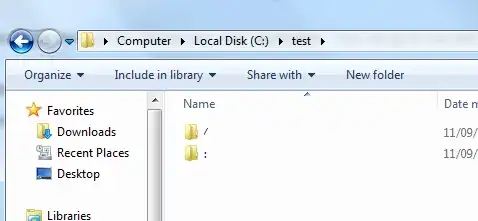I need to do create a file with a filename such as :>?, is this possible somehow? Windows stops it.
7 Answers
Unfortunately, you cannot use the reserved characters when creating folders or files due to them being part of system functions.
What I recommend you do is look through the Character Map application - You can go to run and type charmap.
from here, you may be able to find alternate symbols that look the same, for example:
(copy and paste these, you will see that they are different)
Instead of forward slash / - you can use a division symbol ∕
Instead of Colon : - you can use the modifier letter colon ꞉
and so on!

- 8,364
- 117,648
Some operating systems prohibit some particular characters from appearing in file names: (Resource from Wikipedia)
/ slash used as a path name component separator in Unix-like, Windows, and Amiga systems. (The MS-DOS command.com shell would consume it as a switch character, but Windows itself always accepts it as a separator[2][vague])
\ backslash Also used as a path name component separator in MS-DOS, OS/2 and Windows (there is no difference between slash and backslash); allowed in Unix filename
? question mark used as a wildcard in Unix, Windows and AmigaOS; marks a single character. Allowed in Unix filenames
* asterisk used as a wildcard in Unix, MS-DOS, RT-11, VMS and Windows. Marks any sequence of characters (Unix, Windows, later versions of MS-DOS) or any sequence of characters in either the basename or extension (thus "." in early versions of MS-DOS means "all files". Allowed in Unix filenames,
: colon used to determine the mount point / drive on Windows; used to determine the virtual device or physical device such as a drive on AmigaOS, RT-11 and VMS; used as a pathname separator in classic Mac OS. Doubled after a name on VMS, indicates the DECnet nodename (equivalent to a NetBIOS (Windows networking) hostname preceded by "\".)
| vertical bar designates software pipelining in Unix and Windows; allowed in Unix filenames
" quotation mark used to mark beginning and end of filenames containing spaces in Windows
< less than used to redirect input, allowed in Unix filenames
> greater than used to redirect output, allowed in Unix filenames
. period allowed but the last occurrence will be interpreted to be the extension separator in VMS, MS-DOS and Windows. In other OSes, usually considered as part of the filename, and more than one full stop may be allowed.
The only way is to manually edit the hard drive using a program like HxD. If you do this though, most likely the files won't be accessible by any program. For example, if you tried to open a file named abc\def.txt, you'd get a message that the directory abc doesn't exist.
- 2,337
You can install the Subsystem for Unix Applications if you're on Ultimate or Enterprise. From there you can create such names.
- 41,098
Like William Hilsum's post suggested, you can use similar looking characters. The article How to work around Windows' restricted characters on MythOfEchelon.co.uk includes full-width alternatives and others. (The table below includes suggestions from the comments on that article.):
| Symbol | Name | Unicode code |
|---|---|---|
| ⧵ | Reverse Solidus Operator | U+29F5 |
| ∕ | Division Slash | U+2215 |
| ꞉ | Modifier Letter Colon | U+A789 |
| ⁎ | Low Asterisk | U+204E |
| ⃰ | Thin space followed by combining asterisk above | U+2009, U+20F0 |
| ? | Fullwidth Question Mark | U+FF1F |
| “ | Left Double Quotation Mark | U+201C |
| ” | Right Double Quotation Mark | U+201D |
| ˂ | Modifier Letter Left Arrowhead | U+02C2 |
| ˃ | Modifier Letter Right Arrowhead | U+02C3 |
| < | Fullwidth Less-Than Sign | U+FF1C |
| > | Fullwidth Greater-Than Sign | U+FF1E |
| ⏐ | Vertical Line Extension | U+23D0 |
- 566
- 1
- 4
- 21